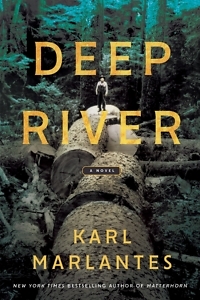Every Kind of Power in Play
Karl Marlantes’ Deep River is a sweeping epic of the immigrant experience in the Pacific Northwest
Karl Marlantes’ journey from obscurity to bestselling novelist in some ways mirrors the lives of the characters in his remarkable new novel, Deep River, a sprawling epic that charts the immigrant experience through the history of the logging and cannery industries and the rise of organized labor in early 20th-century Oregon.

Marlantes wrote his first novel, Matterhorn, based on his experiences as a combat Marine in Vietnam. After experiencing countless rejections, he finally sold the book in 2009 to a tiny vanity press. A year later, thanks to enthusiastic word-of-mouth, the book was acquired by Atlantic Monthly Press and became a surprise bestseller. Matterhorn defied conventional expectations for American war novels post-Vietnam. Sweeping in scope and focused less on the politics of the war than on an immersive account of the soldier’s experience, the book had more in common with Stephen Crane’s The Red Badge of Courage than with the edgier, postmodern work of Tim O’Brien or 21st-century fiction by Iraq and Afghanistan war veterans.
Deep River is equally idiosyncratic in its traditionalism. When one thinks of novels involving logging and labor strife in Oregon, Ken Kesey’s stylistically surreal Sometimes a Great Notion leaps to mind, but Deep River owes much more to the influence of John Steinbeck. Marlantes’ Dust Bowl is Russian-occupied Finland, from which the three Koski siblings flee to begin anew in the Great Northwest of the United States. Through each of the siblings, Marlantes patiently explores separate strands of American identity flowing from the origins of the country and the post-Civil War immigrant experience.
 Ilmari Koski, the eldest of the three, sees the wealth available in the woods, but his ambition is to serve God by turning timber into a thriving Lutheran church. His younger brother Matti follows the archetypal trajectory of the American Dream, hoping to translate his gifts as a logger into fortune and prosperity. Aino, their little sister, is the novel’s Tom Joad. Radicalized by tragedy in Finland, Aino embraces Marxism and becomes an unlikely leader in organizing the loggers to demand better pay and safer working conditions.
Ilmari Koski, the eldest of the three, sees the wealth available in the woods, but his ambition is to serve God by turning timber into a thriving Lutheran church. His younger brother Matti follows the archetypal trajectory of the American Dream, hoping to translate his gifts as a logger into fortune and prosperity. Aino, their little sister, is the novel’s Tom Joad. Radicalized by tragedy in Finland, Aino embraces Marxism and becomes an unlikely leader in organizing the loggers to demand better pay and safer working conditions.
Marlantes weaves their stories together deftly, illustrating the intersections between each theme across the siblings’ journey. Just as Steinbeck drew inspiration from the Bible, Marlantes bases his tale on The Kalevela, an ancient collection of songs that became critical to Finnish identity and the preservation of the Finnish language during the decades of Russian oppression leading up to and through the Bolshevik Revolution. The subtle undercurrent of The Kalevela, juxtaposed with evangelical Lutheranism and the mysticism of the indigenous peoples of the Pacific Northwest, gives Deep River a sense of uncommon timelessness appropriate to its scope and sensibility.
In the end, however, the strength of Deep River lies in its unflinching depiction of the struggle for and against power. “Power is the ability to reward or punish,” Marlantes writes. “It comes in different currencies: sex, giving or withholding; violence, actual or threatened. The best is money.” In Deep River, every kind of power is in play, in a host of settings from the spiritual to the domestic to the institutional and political. It is epic in the truest and best sense and bracingly relevant in its themes. Best of all, it’s a first-rate story, patiently drawn, populated by unforgettable characters in a narrative that will immerse readers in the kind of grand imaginative experience all too rare in contemporary American fiction.

Ed Tarkington’s debut novel, Only Love Can Break Your Heart, was published by Algonquin Books in 2016. His second novel, So Wise So Young, is forthcoming from Algonquin in fall 2020. He lives in Nashville.


